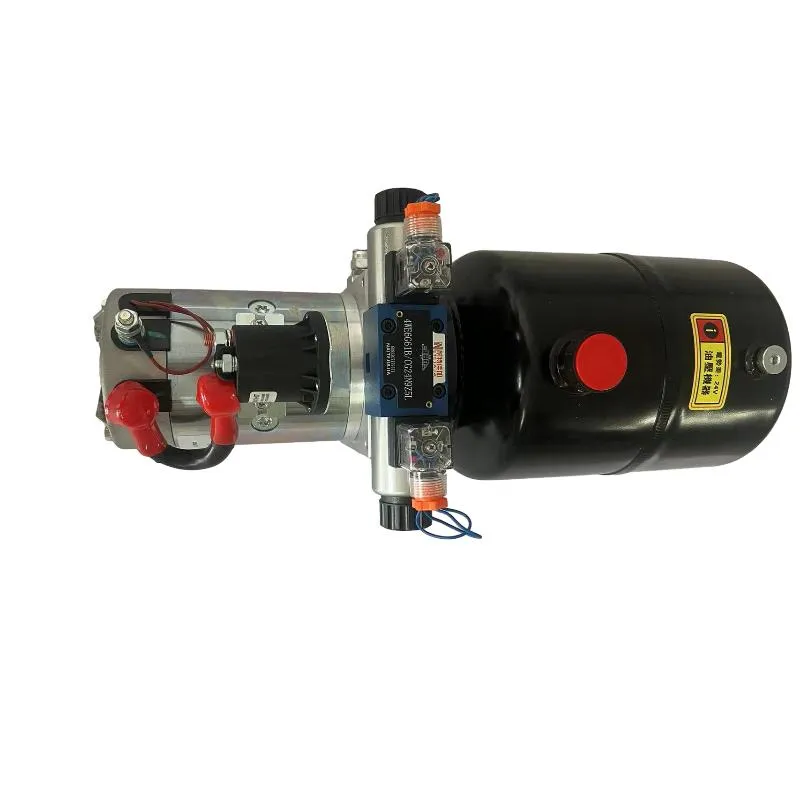Oct . 13, 2024 02:15 Back to list
Electric Hydraulic Power Units for Efficient Energy Solutions and Enhanced Performance
Understanding Electric Hydraulic Power Units A Comprehensive Overview
In the realm of industrial machinery and equipment, electric hydraulic power units (EHPUs) have gained significant traction due to their efficiency, versatility, and environmental advantages. These units are critical in various applications, ranging from construction and manufacturing to automotive and aerospace. This article aims to provide an in-depth understanding of electric hydraulic power units, their components, benefits, and applications.
What is an Electric Hydraulic Power Unit?
An electric hydraulic power unit is a system consisting of an electric motor, hydraulic pump, reservoir, and various hydraulic components designed to convert electrical energy into hydraulic energy. This conversion allows the system to generate high-force outputs used to operate machinery and perform tasks where conventional mechanical power may be impractical. EHPUs are typically characterized by their compact design, low noise emissions, and precise control.
Components of Electric Hydraulic Power Units
1. Electric Motor The heart of the EHPUs, the electric motor drives the hydraulic pump. The motor can be an AC or DC type, depending on the application requirements. The choice of motor affects the power output and efficiency of the unit.
2. Hydraulic Pump The pump's primary function is to convert mechanical energy from the motor into hydraulic energy. There are several types of hydraulic pumps, including gear pumps, vane pumps, and piston pumps. The selection of the pump type depends on the desired flow rate and pressure requirements.
3. Reservoir The hydraulic fluid reservoir stores the hydraulic oil, which is essential for transferring power within the system. Proper reservoir design is crucial for maintaining fluid levels, ensuring efficient cooling, and allowing for the removal of contaminants.
4. Control System EHPUs are equipped with control systems that manage the motor and pump operations. This includes variable frequency drives (VFDs) that enable precise regulation of the motor speed and torque, allowing for enhanced control over hydraulic functions.
5. Hydraulic Components These include cylinders, valves, and hoses that facilitate the movement and direction of the hydraulic fluid. The design and selection of these components play a pivotal role in the overall performance of the power unit.
electric hydraulic power unit product

Benefits of Electric Hydraulic Power Units
1. Efficiency EHPUs are renowned for their energy efficiency. By utilizing electric power directly, they minimize energy losses often seen in pneumatic or mechanical systems.
2. Environmental Impact With rising environmental concerns, electric hydraulic units offer a cleaner alternative to traditional hydraulic systems, significantly reducing emissions and noise pollution.
3. Precision Control The integration of advanced control systems allows for precise maneuvering and speed control, making EHPUs suitable for applications requiring high precision.
4. Reduced Maintenance The simpler design and fewer moving parts in EHPUs lead to lower maintenance requirements compared to conventional hydraulic systems, which often rely on combustion engines.
5. Versatility EHPUs are versatile and can be used in various sectors, including manufacturing, agricultural machinery, material handling, and robotics, adapting seamlessly to different operational demands.
Applications of Electric Hydraulic Power Units
Electric hydraulic power units are widely used across several industries. In manufacturing, they are employed to operate hydraulic presses and injection molding machines. In the construction sector, EHPUs power machinery such as excavators and forklifts. Furthermore, automotive manufacturing utilizes EHPUs for assembly line operations, while aerospace applications leverage their power for testing and component handling.
Conclusion
Electric hydraulic power units represent a significant advancement in the realm of hydraulic technology. Their efficiency, environmental benefits, and versatility make them an ideal choice for modern industrial applications. As industries continue to evolve and seek sustainable solutions, EHPUs will undoubtedly play a crucial role in shaping the future of machinery and power transmission systems.
-
Fork Lift Power Units - Hebei Shenghan | Efficiency, Reliability
NewsJul.13,2025
-
1.5-Ton Turbocharged Cylinder-Hebei Shenghan|Hydraulic Solution,Energy Efficiency
NewsJul.13,2025
-
Auto Hoist Power Units-Hebei Shenghan|Efficiency&Industrial Lifting
NewsJul.13,2025
-
Double Acting Power Units-Hebei Shenghan|Hydraulic Solutions,Industrial Efficiency
NewsJul.13,2025
-
1.5 Ton Lifting Cylinder 70/82-40-290-535 - High-Performance Hydraulic Solution | Hebei Shenghan
NewsJul.13,2025
-
Fork Lift Power Units - Hebei Shenghan | Efficiency&Reliability
NewsJul.13,2025
